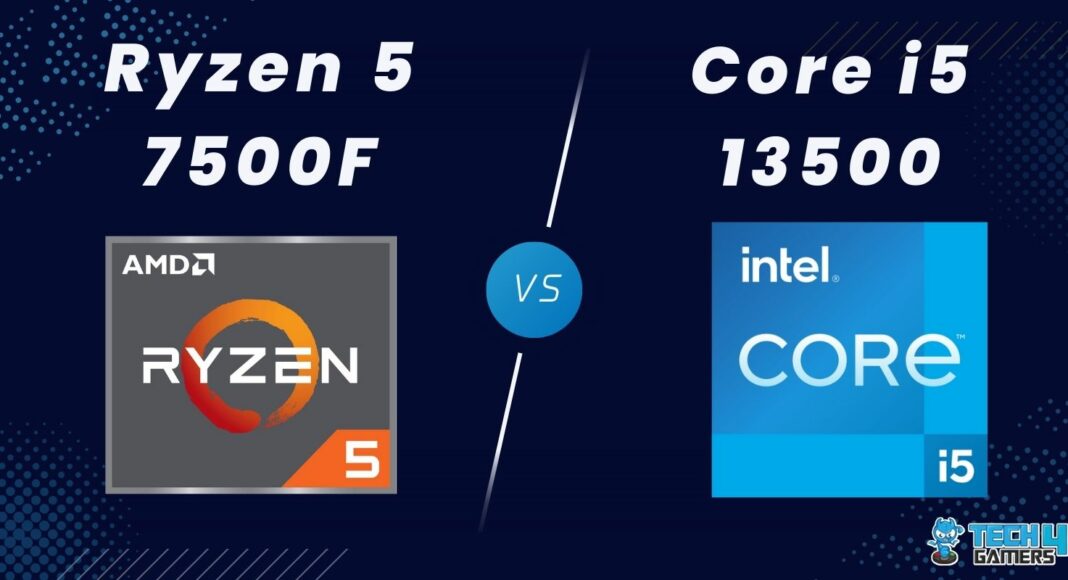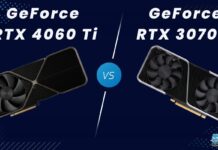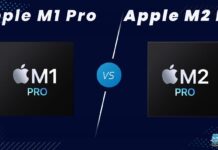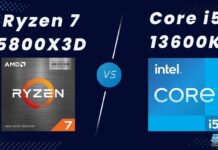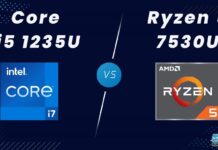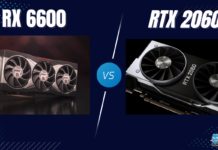AMD Ryzen 5 7500F
Rated: 8/10
Intel Core i5 13500
Rated: 7/10
Pros And Cons
| CPU | Pros | Cons |
|---|---|---|
| Core i5 13500 | ✅ Cooler Thermal Levels ✅ Higher Core Count | ❌ Mediocre Gaming Performance ❌ More Expensive |
| Ryzen 5 7500F | ✅ Better Gaming performance ✅ Lower Price | ❌ Greater Platform Cost ❌ Higher Temperatures |
- The Ryzen 5 7500F performed 6.7% better in our gaming tests at 1080p than the i5 13500.
- In our testing, we also noticed that the i5 13500 was 2.8% cooler than the AMD processor on average. This puts the i5 13500 forward on thermal charts.
- Finally, the i5 13500 has a price tag of $239, whereas the Ryzen 5 7500F can be had for 25% lower at $179.
Comparison Table
| Specification | Intel Core i5 13500 | Ryzen 5 7500F |
|---|---|---|
| Architecture | Alder Lake S Refresh | Zen 4 |
| Operating System | Windows 10, Windows 11, Linux | Windows 10, Windows 11, Linux |
| Integrated GPU | Intel UHD Graphics 770 | – |
| Max. Memory | 128GB | 128GB |
| Overclocking | No | Yes |
| L2 Cache | 11.50MB | 6MB |
| L3 Cache | 24MB | 32MB |
| Default TDP | 65W | 65W` |
| Max. TDP | 154 W | – |
| Max. Temperature | 100 °C | 95 °C |
| Launch Date | Q1/2023 | Q3/2023 |
| MSRP | $239 | $179 |
Architectural Differences
- Core Count: The Ryzen 5 7500F has 6 cores and 12 threads, but the situation of the Core i5 13500 is different because of its hybrid core architecture. It has 6 performance cores and 8 efficiency cores that help the processor draw less power in lower-intensity processes.
- Clock Speeds: The i5 13500 can clock at 2.50GHz at its lowest and 4.80GHz at its highest, whereas the Ryzen outclasses it in both metrics with a base clock of 3.70GHz and a boost of up to 5.00GHz.
- Lithography: Intel has been using the 10nm manufacturing process for a while now, and they stuck with it for the i5 13500. On the other hand, Ryzen uses a more advanced 5nm manufacturing process.
- Memory Support: The Ryzen 5 7500F can only support DDR5 memory at up to 5200MHz, whereas the i5 supports both DDR4 memory at 3200MHz and DDR5 memory at up to 4800MHz. From a speed point of view, the Ryzen can go faster, but from a cost-efficiency perspective, you don’t even have to think about changing RAM sticks with the Intel CPU if your rig was made in the last few years.
- Other Features: The i5 13500 uses a more tried and tested LGA 1700 socket, compatible with Intel’s 12th-generation processors. This means if you have a 12th-generation PC, upgrading is as simple as taking the old CPU out and putting the new one in. On the other hand, AMD just shifted to a new AM5 socket after using AM4 since the inception of Ryzen, bringing up the platform cost of this processor.
The Ryzen 5 7500F and the Core i5 13500 cater to budget-conscious gamers, but how would they compare if we pinned them against each other? This Ryzen 5 7500F vs Core i5 13500 comparison will deal with both big CPU makers’ different approaches with their budget processors.
Ryzen 5 7500F Vs Core i5 13500 – Gaming Benchmarks
You can only gather so much from the on-paper specifications of computer hardware, which is exactly why this part of the Ryzen 5 7500F vs Core i5 13500 comparison will highlight the performance of both CPUs within modern titles.
Let’s look at the test bench:
- OS – Windows 11
- CPU Cooler – Cooler Master MasterLiquid Lite ML240L RGB
- SSD – XPG Gammix S70 Blade 2TB NVMe
- Power Supply – ENERMAX REVOLUTION D.F. X 1050W
- GPU – GIGABYTE RTX 3070 VISION OC
Player Unknown’s Battlegrounds
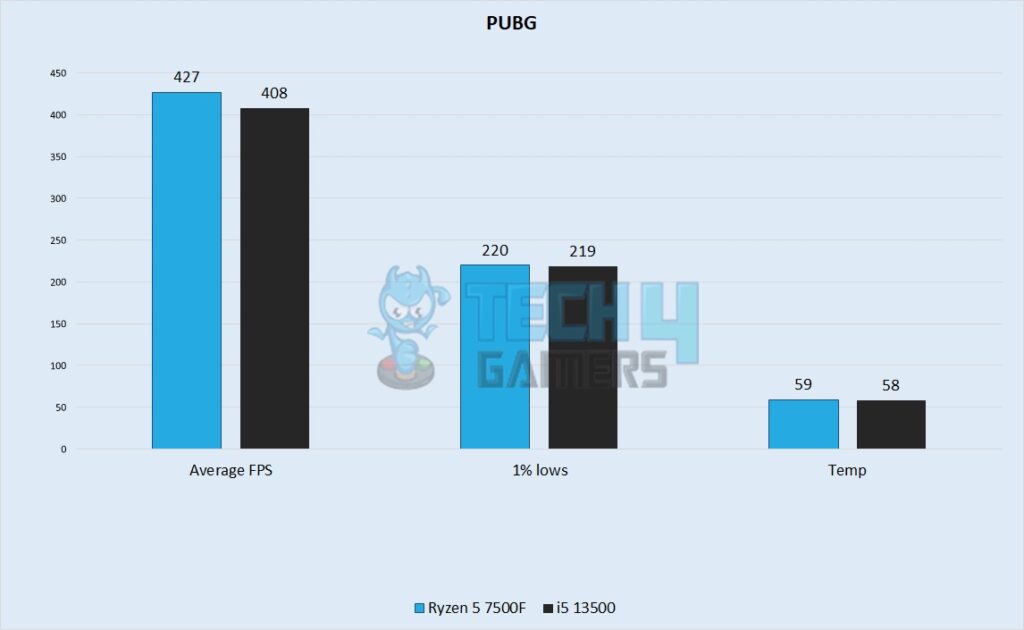
- Kicking off the comparison with PUBG at 1080p with Ultra settings, we see that the Ryzen 5 7500F pulled ahead with an average framerate of around 427 FPS, which is around 4.6% higher than the Intel CPU at 408 FPS.
- 1% lows were more or less the same on both processors, with the Ryzen maintaining 220 FPS, whereas the Core CPU had 219 FPS on the minimum in our PUBG benchmark.
- The variation between the temperatures of both processors at the peak was also more or less non-existent, with the Ryzen 5 7500F reaching a peak temperature of 59°C, whereas the 13500 was a hair cooler with a peak temperature of 58°C.
League Of Legends
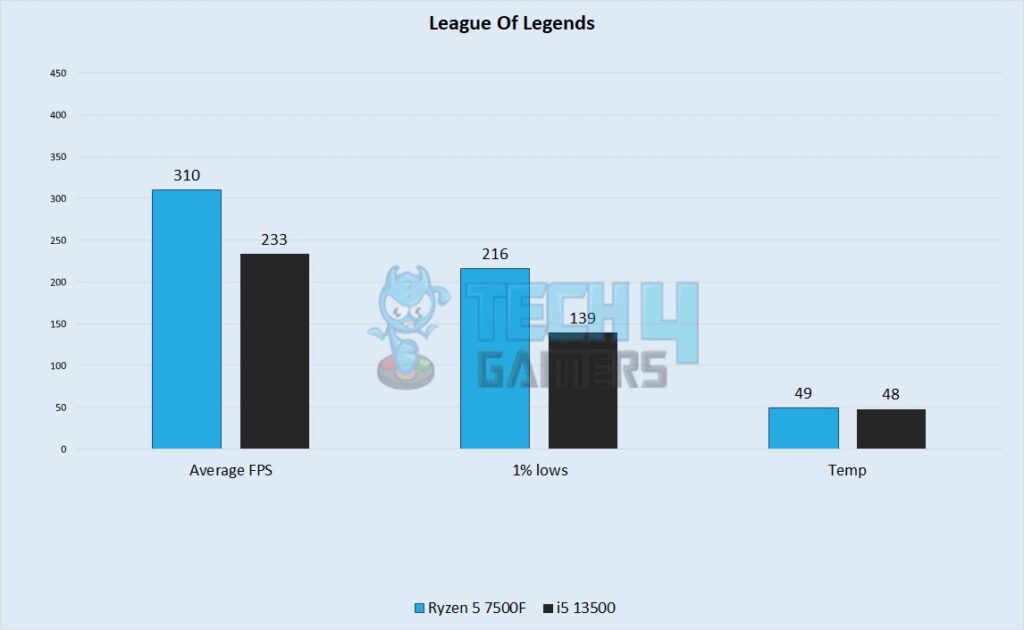
- Observing the competitive League Of Legends, it gave a very strong advantage to the AMD processor, which had an average framerate of 310 FPS, 33% higher than the i5 13500’s average of 233 FPS.
- The difference we saw with the 1% lows was even larger at 55% in favor of the 216 FPS outputted by the Ryzen, whereas the 13500 had lows of 139 FPS. In a story-driven game, we would have said that having such high FPS to begin with means the difference is not noticeable by most, but in the competitive world of League Of Legends, every frame can make a difference in response time.
- Temperatures were once again very similar between the pair of these processors, with the Ryzen 5 7500F having a peak temperature of 49°C, whereas the Core i5 13500 had a slightly cooler 48°C peak temperature.
Overwatch 2
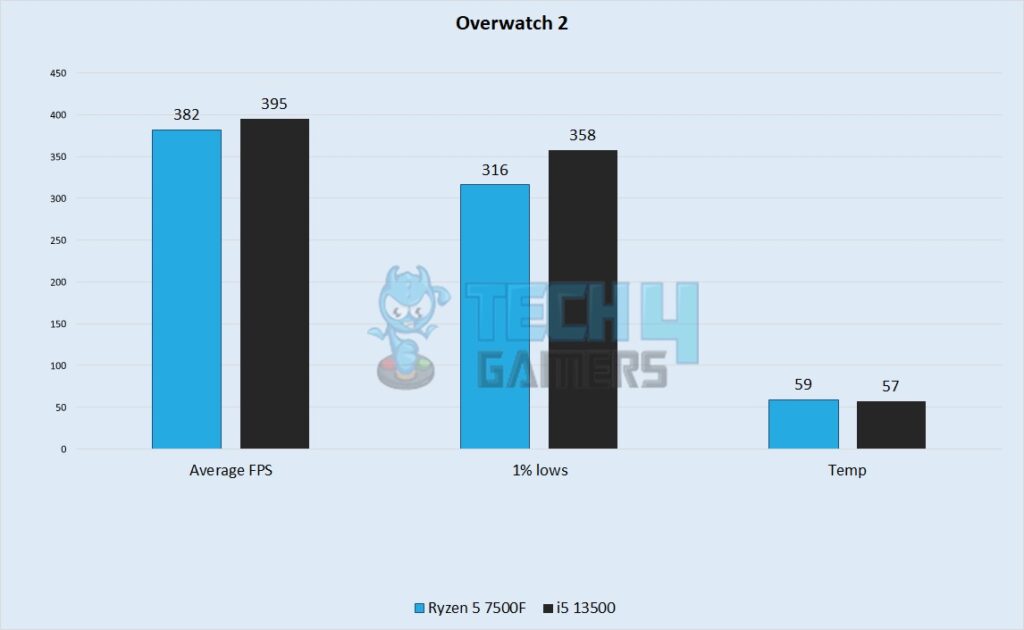
- The Ryzen saw its first loss in the Overwatch 2, performing close to 4% worse on the 7500F than the Intel CPU. The former got an average framerate of 382 FPS, whereas the i5 13500 had a performance of 395 FPS.
- AMD took an even bigger loss in terms of 1% lows, maintaining 316 FPS, whereas we saw that the Core i5 had a performance of 358 FPS. The advantage of the i5 grew to 13% over the Ryzen 5 in this department.
- We started to see a larger deviation between the temperatures of the two processors in this game, with the Ryzen 5 7500F reaching a peak of 59°C, whereas the i5 13500 got a peak of 57°C.
Lost Ark
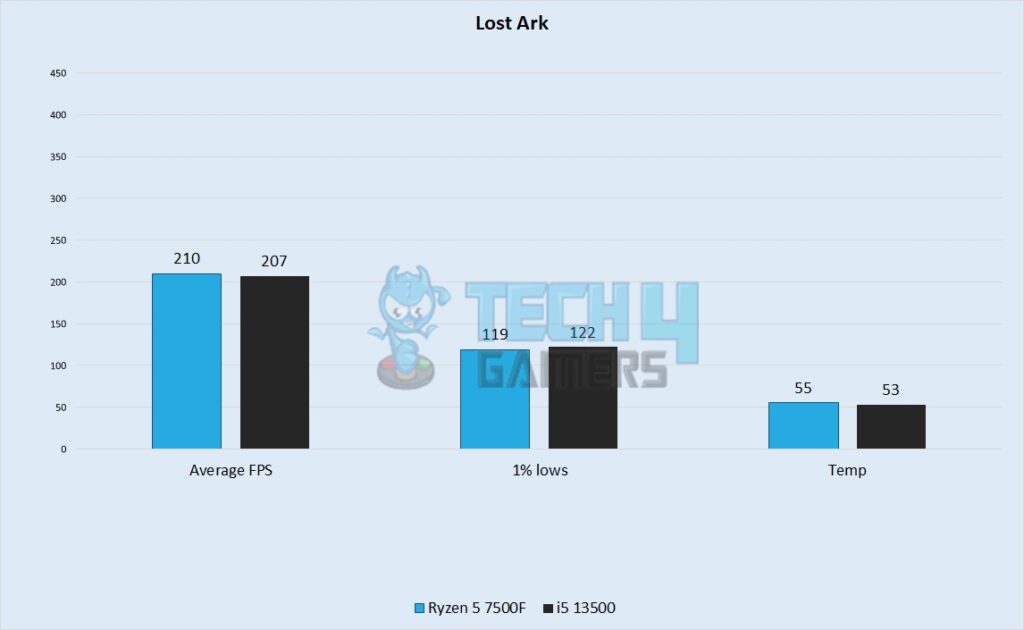
- AMD regained its lead in this title, with Lost Ark running a minuscule 1.5% faster on the Ryzen with an average framerate of 210 FPS, whereas its rival had an average framerate of 207 FPS.
- The pendulum swung back to Intel when it came to 1% lows, where it was 2.5% more performant than its competitor, which had a minimum of 119 FPS, whereas the i5 13500 had a minimum framerate of 122 FPS.
- Temperatures again had a two-degree difference between the processors, with the Ryzen running at a temperature of 55°C at its peak, whereas the 13500 got a peak temperature of 53°C.
Dota 2
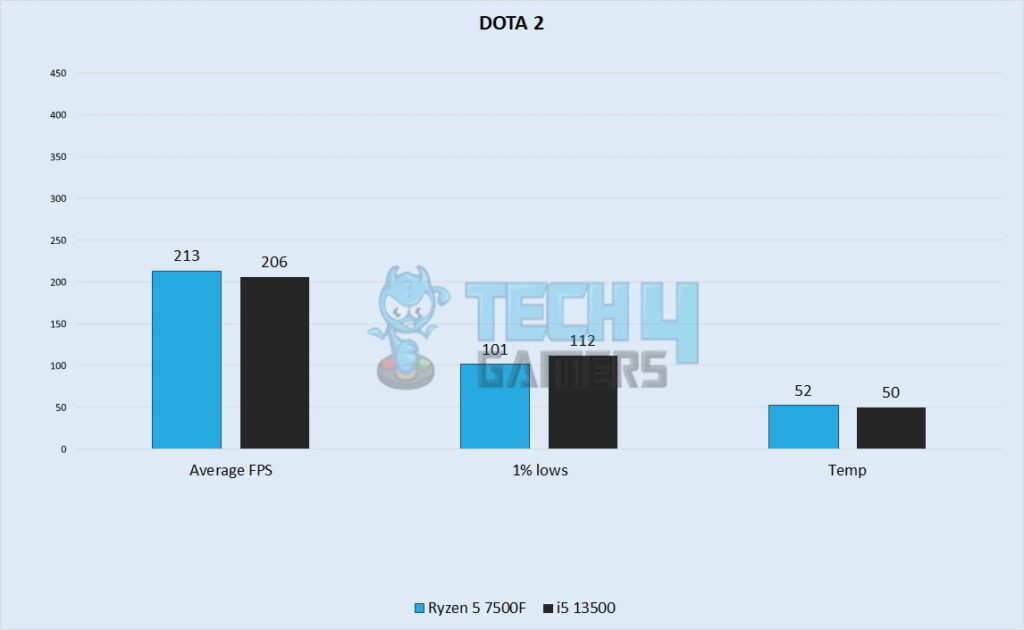
- According to our Dota 2 benchmark, it also ran better on the Ryzen by about 3.3%. The 7500F had an average framerate of around 213 FPS, whereas the i5 13500 pumped out 206 FPS.
- The crown went over to the Intel processor in 1% lows, beating the Ryzen by about 10%. The i5 had a minimum framerate of 101 FPS, whereas its rival managed a minimum of 112 FPS.
- Temperatures remained two degrees apart in this test, with the Ryzen having a peak temperature of 52°C, whereas the i5 13500 peaked at around a cool 50°C.
Cyberpunk 2077
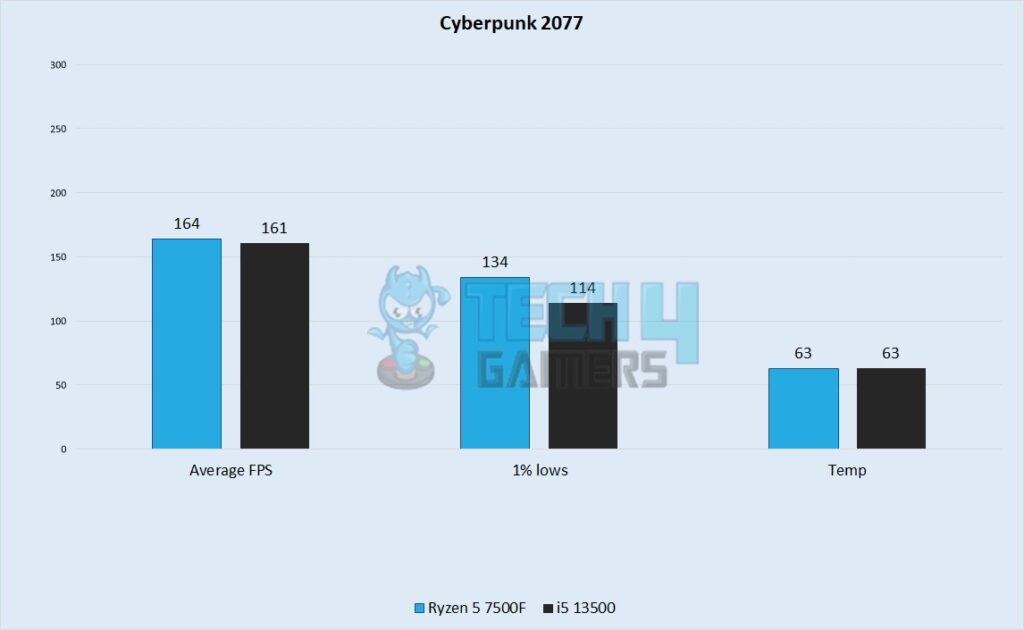
- Even at a low resolution, Cyberpunk proved to be so graphically demanding that our processors didn’t have room to stretch their legs, only being 1.8% apart in average framerates. The Ryzen 5 7500F got an average of 164 FPS, whereas the 13500 had an average framerate of 161 FPS.
- The Ryzen pulled through in terms of 1% lows, beating out the Core CPU by about 17%. The Ryzen 5 7500F got minimums of 134 FPS, whereas the 13500 had lows of around 114 FPS.
- Temperatures finally equalized with these processors after dancing around each other for all the games before. Here, the Ryzen 5 7500F and Core i5 13500 both peaked at 63°C.
Diablo 4
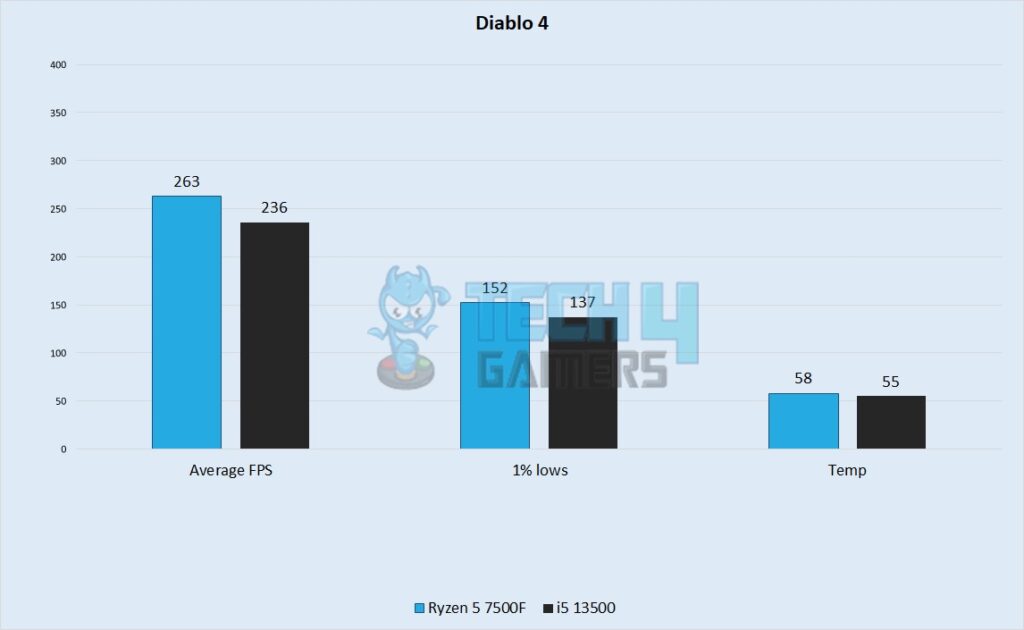
- Finally, the last game in our testing, Diablo 4, ran better on the Ryzen 5 7500F by about 11%. AMD’s processor had an average framerate of 263 FPS, whereas the i5 13500 averaged around 236 FPS.
- The difference remained about 11% in the 1% lows, with the Ryzen 5 7500F maintaining a minimum of 152 FPS, whereas the Core i5 13500 had several dips to around 137 FPS.
- The temperature difference grew to three degrees in this final game, with the Ryzen reaching 58°C, whereas the 13500’s temperature peaked around 55°C.
Core i5 13500 Vs Ryzen 5 7500F – Which One To Choose?
AMD Ryzen 5 7600F: In our experience, we found that the Ryzen 5 outperformed its rival by 6.6% at 1080p, making it superior for gaming. However, its lack of integrated graphics means you’ll need a dedicated GPU for display. Still, for new gaming rigs targeting 1080p/1440p with a solid GPU, the Ryzen 5 7500F offers impressive longevity.
Intel Core i5 13500: As for our use of the i5 13500, while it may seem pricier at first, the costs associated with an AM5 motherboard and DDR5 memory could potentially make it equally or even more expensive overall. Additionally, Intel’s continued reliance on the LGA 1700 socket might complicate future upgrades.
As far as our recommendations go, Intel offers smoother upgrades for existing 12th-gen systems. For CPU-heavy tasks, Core i5 13500’s extra cores make it our superior choice. Our recommendation falls in the i5 13500’s lap as well due to this reason.
Frequently Asked Questions
If there is an F at the end of an Intel or AMD CPU, it means that they do not include an integrated GPU into their architecture.
If you choose to get the i5 13500, you will probably not be able to make any generation-to-generation upgrade, but you can upgrade within the 13th generation to up to an i9 13900KS.
No, the Ryzen 5 7500F only supports DDR5 memory.
More From Ryzen 5 7500F:
More From Core i5 13500:
Thank you! Please share your positive feedback. 🔋
How could we improve this post? Please Help us. 😔
[Comparisons Specialist]
I’m a passionate computer hardware expert specializing in CPUs and GPUs. With a lifelong curiosity for hardware and extensive hands-on experience, I provide valuable insights, practical advice, and in-depth analysis on these components. Engaging with the hardware community, I exchange knowledge and stay at the forefront of technological advancements.
Get In Touch: uzair@tech4gamers.com


